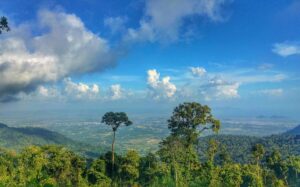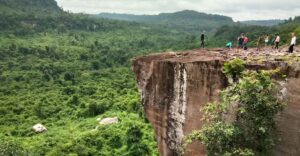For experienced riders, Cambodia is one of the most rewarding off-road biking destinations in the world.
Many consider some remote roads in Cambodia to be among the worst in Southeast Asia – which only increases their allure for die-hard biking enthusiasts. In fact, while there are incredible rides all over the country, we recommend staying away from the main highways as traffic and dust make them a challenge.
The advantage of motorcycle travel? It allows for complete freedom of movement and stops in small villages that tourists rarely visit. It is possible to take motorcycles up-country for tours, though only experienced off-road bikers should take to these roads with a dirt bike. There are several specialized dirt-bike touring companies that offer organized trips with support vehicles.
Rewarding day trips on smaller bikes in destinations like Siem Reap and Kampot offer a great way to see Cambodia’s countryside in all its colorful glory.
Motorcycles are available for hire in most popular tourist destinations, with costs ranging from US$5–10 per day for a 100cc motorcycle to US$15–25 for a 250cc dirt bike. When it comes to renting motorcycles, no license is required. If you can drive the bike out of the shop, you can drive it anywhere – or so the logic goes.
Novice riders should stick to riding smaller automatic mopeds. Drive with due care and attention, as medical facilities and ambulances are less than adequate beyond the main cities. If you have never ridden a motorcycle before, Cambodia is not the ideal place to learn, though once out of the city it does get easier. If you’re jumping in at the deep end, make sure you are under the supervision of someone who knows how to ride.
10 Best Things To Do in Cambodia 2025
Top 10 Must-See Destinations in Stunning Cambodia
11 Very Best Places in Phnom Penh, Cambodia to Visit
Kampot to Bokor: A Scenic Adventure

82km (51 miles); day trip
Part of Bokor National Park, the once-abandoned French retreat of Bokor Hill Station is famed for its refreshingly cool climate and decaying buildings that once offered a popular escape from the heat during the colonial period. The winding mountain road up to Bokor from the riverside town of Kampot is arguably the most memorable in Cambodia, climbing 1000m (3280ft) in altitude in less than 20km (12mi). There are sweeping bends with panoramic views over the dense tropical rainforest of the national park and the Cambodian coastline.
Atop the mountain, visitors can see the remains of King Sihanouk’s Black Palace and a giant statue of Buddha, an essential stop for Khmer pilgrims. Continue along the plateau and the road forks, the right fork heading to Popokvil Falls and the left fork continuing to the old hill station.
The hill station is not quite as atmospheric as it once was due to a new, monstrous casino on the summit, but the abandoned Catholic Church and other old buildings are still haunting on a misty day. The views from Le Bokor Palace are simply immense, the jungle cascading away to the coastline below.
Explore Ancient Temples from Siem Reap to Phnom Kulen

150km (93 miles); day trip
Considered by Khmers the most sacred mountain in Cambodia, Phnom Kulen is a popular place of pilgrimage for local worshippers and home to the “lost city” of Mahendraparvata. Attractions include a giant reclining Buddha, hundreds of lingas carved in the riverbed, an impressive waterfall, and some remote temples scattered over the mountain.
Once you pass the Phnom Kulen ticket checkpoint (US$20 per person), the road climbs up through jungle and boulders to pass the stunning viewpoint of Peung Ta Kho en route to Preah Ang Thom and the iconic waterfall. Many Cambodian pilgrims visit only this site on their trip, but it is worth venturing further afield to see the stone guardians of the mountain at Sra Damrei, including a life-sized elephant; the nearby bat cave with its hidden shrines; and the ancient rock carvings of Peung Tbal.
Bike Along the Mekong River from Kompong Cham to Kratie
150km (93 miles); one day
The main road from Kompong Cham swings out east into Tbong Khmum Province, but for a memorable ride, stick to the Mekong River and follow the local roads north. Most of the roads are now paved, with only a few sections of graded dirt road here and there.
Starting out in Kompong Cham, head north on the west bank to the hilltop complex of Wat Hanchey, which includes a 7th-century brick temple in its grounds and offers views over the Mekong River. Continuing north, there is a new bridge at Stung Trang to cross to the east bank or continue further north over the elevated rubber plantations for some more impressive views of the river. Eventually, the west bank road brings you to a ferry crossing to the old French colonial-era port town of Chhlong, famous for its crumbling colonial-era buildings.
From Chhlong, it’s a straight shot on the 35km (22mi) road north to Kratie, passing through some traditional Cham fishing villages. Once in Kratie, make a side trip to the beautiful Mekong island of Koh Trong, famous for its fresh pomelo and orchard fruits. Note that it’s best to switch to pedal power to explore this island.
Journey Through the Cardamom Mountains
280km (174 miles); 2 days
Spread over seven provinces in southwestern Cambodia, the vast Cardamom Rainforest Landscape represents the largest mainland forest watershed in Southeast Asia. The remote peaks here and 18 major waterways are home to at least 50 globally threatened animal species.
Setting out from the charming riverside town of Battambang, head south via the former Khmer Rouge stronghold of Samlaut to the Cardamom junction town of Pramouy, a possible base for the night. Route NH55 heads west to the Thai border of Thmor Da and is one of the most dramatic roads in the country, climbing up over the creatively named Phnom 1500m (4921ft) mountain and dropping slowly down a meandering river valley to the border.
From Thmor Da, a dirt road hugs the entire length of the Cambodia–Thailand border and offers some beautiful glimpses of Phnom Samkos Wildlife Sanctuary. The road passes mountain rivers and dense jungle before opening up over views of the Thai coastline to the west. On the descent into Koh Kong City, there are stunning views of the huge rivers flowing down towards the sea.
Adventure from Siem Reap to Prasat Bakan
270km (168 miles); 2-day round trip
For a tantalizing lost-world ambience, the remote temple of Prasat Bakan (also known as Preah Khan Kompong Svay to scholars) is hard to beat. Covering almost 5 sq km (2 sq mi), Prasat Bakan is the largest temple enclosure constructed during the Angkorian period. The site is cloaked in vines and trees and is astonishingly peaceful; you might even have the place to yourself.
For the ultimate dirt-bike adventure, follow Route 66 from Beng Mealea along the ancient Angkor road. This 1000-year-old trail crosses about 10 Angkorian naga (mythical serpent-like beings) bridges, including the remarkable 77m-long (252ft) Spean Ta Ong. The road from Beng Mealea to Khvau is now in fine condition, but it deteriorates rapidly after Khvau and the 23km (14mi) from Khvau to Ta Seng are impassable in the rainy season.
Traditionally, Preah Khan has been the toughest of Preah Vihear Province’s remote temples to reach, but upgraded provincial highways and a new dirt road to the temple have improved things dramatically from the southern or eastern approaches. Only experienced bikers should attempt these alternative routes on rental motorcycles, as conditions are tough and you could end up lost in the middle of nowhere.
Tips for Safe Motorcycle Adventures in Cambodia
- Get a good-quality helmet for long journeys or high-speed riding.
- Carry a basic repair kit, including tire levers, a puncture-repair kit, and a pump.
- Always carry a rope for towing on longer journeys in case of breakdown.
- In remote areas, always carry several liters of drinking water.
- Travel in small groups, not alone, and stay close together.
- Don’t be cheap with fuel, as running out in a remote area would be a serious situation.
- Do not drink alcohol or smoke marijuana and drive.
- Keep your eyes firmly fixed on the road, as people and livestock regularly cross back and forth without warning. And Cambodian potholes eat people for fun.




